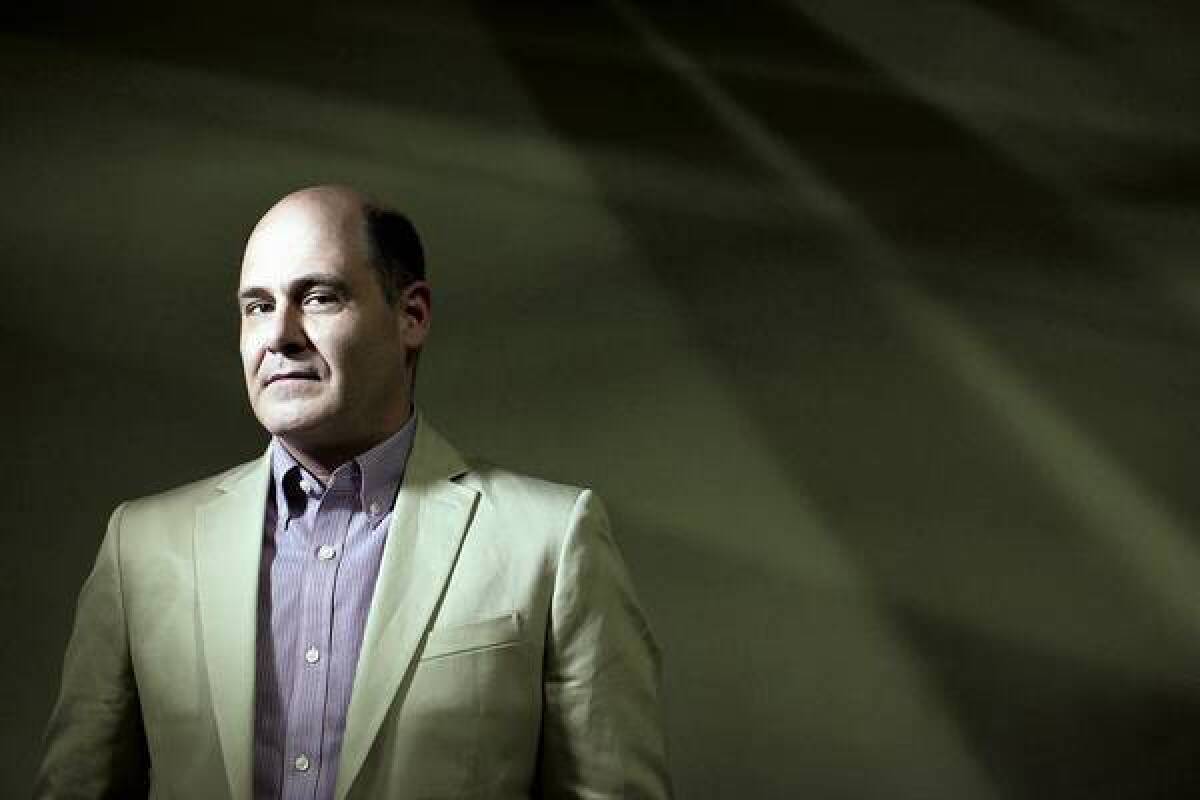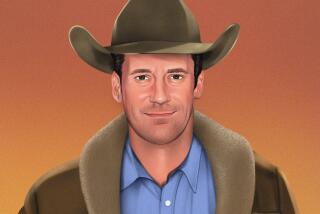Matthew Weiner is the warden of âMad Menâ

The fictional ad executive Roger Sterling has now done hallucinogens. The real show runner Matthew Weiner has not, though he had his chances.
One opportunity for the âMad Menâcreator came as an undergraduate at Wesleyan University in Connecticut during Uncle Duke Day, a campus tradition where some students honored the Doonesbury comic strip character and his fondness for drugs. Weiner remembered a classmate bursting into his room and declaring: âWeâre all going to take mushrooms â and youâre not invited.â
âI was voted most likely to upset everyone,â said Weiner, who laughed and then turned more serious during a lengthy interview at his Los Angeles Center Studios office. âMy father was a neurologist, and I was terrified from a young age of anything that could possibly take away from my faculties or make me jump off a roof.â
Maintaining a sober equilibrium is a career through line for Weiner, who is well aware of his reputation for being â as he has put it before â âan insane control freak.â Itâs a style that has his name stamped on the writing credits for almost 50 of the showâs 65 episodes â a high number for a show runner. But itâs that devil-in-the-details attention, not coincidentally, that has earned his AMC period show built around a Madison Avenue ad firm four consecutive outstanding drama series Emmys.
The 46-year-old writer and executive producer may have passed on a personal experience with psycheledics , but his influential program has been on a wild trip of its own this spring as it descended deeper into the cultural tumult of the 1960s. From âZou Bisou Bisouâ to suicide, and thereâs the fifth-season finale Sunday.
As with every previous season, Weiner was tight-lipped about plot details in the flood of publicity that attended the showâs return in March, even going so far as directing critics not to spoil viewersâ fun by revealing key story lines. But while taking a break from his feature directorial debut, âYou Are Here,â Weiner talked about the narrative choices centered on office politics, marriage, personal pain, sex and race for this seasonâs show, which is enjoying some of its best ratings ever.
âI wanted to tell a story about success, which usually doesnât get told on television because the perception is thereâs no conflict,â said Weiner, munching on an afternoon bagel. âI love the idea that the agency was slowly becoming more successful and nobody seemed aware of it.... A lot of issues we deal with on the show â envy, lack of satisfaction, the focus on work over personal life â are illuminated by the transparent and undeniable success of the agency as it got to its feet.â
A difficult choice
Success, as viewers know from the seasonâs penultimate episode, did not come without conflict for one of the ad agency partners, the Englishman Lane Pryce, who was in a costly battle with his homelandâs tax man and himself. The characterâs untimely end in the episode titled âCommissions and Feesâ marked a milestone â it was the first death of a high-profile character.
âI donât like to use death as entertainment,â said Weiner, previously a writer and executive producer on âThe Sopranos.â âI grew up watching network TV, and during sweeps they would always kill a kid or kill his parents. And by the time I was old enough to realize what it was, I found it unpleasant. But life and death are the ultimate stakes.â
The television landscape has been littered lately with the corpses of major characters on sophisticated dramas like âBreaking Bad,â âBoardwalk Empireâ and âGame of Thrones.â Despite competing with beheadings and booby-trap explosions, the office drama still found a darkly comic way to stand out as it guided the character played by Jared Harristo his final exit. The British gentleman who had embezzled funds hanged himself in his office, but that was not his original method of choice. He was foiled in his first attempt, inhaling car exhaust fumes from his temperamental Jaguar â the prestigious car account his agency had just landed.
âThe long execution and setup of Lane not being able to start that car,â said Weiner, who co-wrote an episode in Season 3 that saw a John Deere lawn mower nearly shear off a hotshot ad executiveâs foot. âThatâs a very, very high-level joke. We were all very, very proud of it.â
The move surprised the cast, said Jon Hamm, who plays the central role of Don Draper. âIt was incredibly emotional to go through as a cast,â said the actor who plays the brilliant advertising executive struggling to find contentment. âIt was a very rough scene, but it came out of a solid narrative footing. It wasnât a trick.â
While others literally left Lane hanging, Hammâs character did the dirty work of barging into Laneâs office and pulling down the body. While Draper has certainly been no Boy Scout this season, that act and others, including urging Joan Harris (Christina Hendricks) not to sleep with a sleazy car dealer for the firmâs gain, put the morally problematic character on a more virtuous path.
Gender relations
Perhaps more startling for Draper were the turns the notoriously womanizing character took with two of the main women in his life. He broke up with one, but it was not his doing, and not the one most would have bet on when the season began. Draperâs longtime protegee Peggy Olson (Elisabeth Moss) accepted a job at a competing firm.
âDon and Peggy are family, but we really felt it was time for Peggy to go,â explained Weiner, who wrote the pilot for âMad Menâ in 2000 while a staff writer on the CBS sitcom âBecker.â âI donât think she left because she was mad at him. She left because at a certain point thereâs no way for her to advance past that image that Don had of her. She didnât want to be the daughter, the sister, the best friendâs kid, the girl from high school. She was thinking of herself for the first time.â
Meanwhile, Draperâs marriage to his former secretary Megan (Jessica Pare) â fired by the pixie dust of Disneyland last season â has shockingly lasted through the season despite its impulsive origins. Their marriage has had its bumps but like the agency has enjoyed a kind of undeniable success that has revealed more about Draper.
âPeople should assume like Don does that he will be married to this woman for the rest of his life,â said Weiner. âThis is not one in a series of marriages for Don. This is the good marriage after the bad one. Of course, heâs part of his time though. Can he really deal with an independent person?â
Or putting it another way, after the coupleâs throw-down in a Howard Johnsonâs parking lot, Weiner explained: âDon deals with the central conflict of the season, which is she doesnât like orange sherbet. What is it like when you love somebody and they donât want to do what you want to do?â
The series put a nice twist on that question with another character asking, âWhat if you donât love somebody or can hardly stand to look at them? Will you have a one-night stand anyway to advance your career and land the Jaguar account?â The dilemma facing Joan lighted up social media and blogs late last month with an outpouring of disgust for Pete Campbell (Vincent Kartheiser), who maneuvers the single mother into an act of glorified prostitution.
But Weiner gets defensive about the character he credits with leading the ad firm to sound financial health. âThatâs adulthood to me; Peteâs a businessman,â he said. âI love the idea of how masterfully he handles that situation.â
As for Joanâs role in bedding down a toad, he added: âItâs an indecent proposal. It really is. On the other hand, I have to say, âBig deal. Big deal.â I wish I could have gotten anything in my life that way â but no one has ever asked me.â
Firm has a future
One issue some thought would be explored more thoroughly this season was race. The premiere featured a civil rights protest and a black secretary was introduced, but after that, the topic was largely ignored.
âI feel like the expectation that introducing a black character means you have to tell the civil rights struggle is in a way racist,â said Weiner. âI use her character the same way I use all the characters on the show. She is there. Iâm sorry if people were disappointed. Do I regret there wasnât more of it? Yeah. All I can say is, itâs early. We have 26 episodes left. I donât feel like in the history of the United States that 1966 was the year of civil rights; itâs early.â
The ratings for the show, which was off the air for nearly 18 months because of a sometimes bitter contract renegotiation with the network and the studio that provided Weiner with a reported $30-million salary over three years, reached new heights this season. The series is averaging 4 million viewers per episode, compared with about 3.3 million last year â a remarkable bump for a cable show in its fifth season. Those figures place the show well above a premium cable critical favorite like HBOâsâGirlsâ but significantly below AMCâs monster hitâThe Walking Dead.â
Part of the spike can be attributed to Netflix, which began offering the series last summer and where it quickly became a favorite program to stream among its more than 20 million subscribers. Still, the show often is criticized for catering to a small, elite audience.
âIs the amount of attention the show gets out of proportion to the number of people who watch?â said Weiner, repeating a familiar dig. âI donât know. I want everyone in the world to watch the show. Itâs not beyond the masses, itâs made for the masses.â
So whatâs ahead Sunday? Again, Weiner will say little about the finale. But he did say that last weekâs episode was the climax and Sundayâs should be considered the denouement.
âItâs orgasmic,â Weiner said with a smile. âThatâs all I can say.â
More to Read
The complete guide to home viewing
Get Screen Gab for everything about the TV shows and streaming movies everyoneâs talking about.
You may occasionally receive promotional content from the Los Angeles Times.






